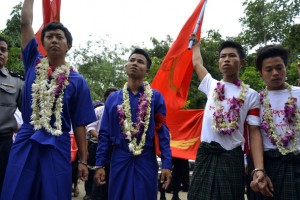For a “Free and Fair” Election, Freedom of Expression Must be Upheld
By Burma Partnership • October 20, 2015 On 14 October 2015, plainclothes police arrested Patrick Khum Jaa Lee on the grounds that he had shared a photo on Facebook that was deemed to be insulting to the Burma Army Chief, Min Aung Hlaing. A similar incident occurred earlier last week, in which 25-year-old Chaw Sandi Htun was arrested and charged under Article 500 of the Criminal Procedure Code for defamation along with the 2004 Electronic Transactions Law for using Facebook to compare the new colour of the Burma Army uniforms to that of Aung San Suu Kyi’s htamein (A traditional sarong worn by women in Burma).
On 14 October 2015, plainclothes police arrested Patrick Khum Jaa Lee on the grounds that he had shared a photo on Facebook that was deemed to be insulting to the Burma Army Chief, Min Aung Hlaing. A similar incident occurred earlier last week, in which 25-year-old Chaw Sandi Htun was arrested and charged under Article 500 of the Criminal Procedure Code for defamation along with the 2004 Electronic Transactions Law for using Facebook to compare the new colour of the Burma Army uniforms to that of Aung San Suu Kyi’s htamein (A traditional sarong worn by women in Burma).
In stark contrast, last year Burma’s Deputy Minister, Ye Htut was merely required to release a public apology after it was found that his wife had released altered photos of Aung San Suu Kyi wearing what appeared to be a hijab.
Ironically, President Thein Sein recently released a video on his own Facebook page, which stated, “Once, [Burma] was a country which was full of censorship where people could never dream of freedom of expression… Since president Thein Sein took charge, everything has changed.”
If anything, freedom of expression in Burma has changed for the worse, especially in the lead up to the 2015 elections. This claim is supported by a new report from Amnesty International, aptly titled Back to the Old Ways, which cites a disturbing increase in the number of recent arrests of human rights defenders as compared to the 2013 – 2014 period.
The 10 March 2015 brutal crackdown on students and activists protesting the National Education Law at Letpadan is a particularly egregious example of the lack of room for free expression. According to Fortify Rights, 77 of the protestors – many of who have faced abuse while in custody – have been charged with sentences that may result in up to nine years and six months in prison.
Similarly last year, five journalists from Unity Weekly were arrested and charged for up to ten years imprisonment after reporting on a suspected chemical weapons factory.
The joint report from the Assistance Association for Political Prisoners and Burma Partnership, How to Defend the Defenders, details how human rights defenders in Burma are subjected to intimidation through extrajudicial killings and violence, sexual violence, discrimination, surveillance, legislative and judicial harassment, arbitrary arrest and detention.
It is clear that the Burma Government does not understand or simply will not allow the people of Burma to enjoy a truly universal freedom of expression. Unfortunately, the freedom to choose one’s opinion – even if it contradicts with the prevailing view of government in power – is a cornerstone of the modern democratic state. With the Union Election Commission (UEC) prohibiting political opposition parties from criticizing both the Burma Army and the 2008 Constitution, democracy in the upcoming 2015 elections is likely to be non-existent.
In addition to the direct suppression of voices, the Burma Government is also utilizing a number of alternative methods to ensure that significant portions of the country’s population remain unheard of during the election period. The UEC’s decision to “screen” certain prospective parliamentary candidates, which disproportionately affects representatives of Muslim minorities, is one such example. The removal of voting rights for the Rohingya, the decision to neglect fixing incorrect voter registrations, and the intimidation of political representatives and voters through proxies of the Burma Army are all further illustrations of the Government’s attempt to silence its opposition.
In a press statement following the release of Back to the Old Ways, Amnesty International researcher Laura Haigh notes, “Myanmar’s authorities have clearly been playing a long game ahead of the elections, with repression picking up pace at least nine months before the campaigning period started in September. Their goal has been straightforward – take ‘undesirable’ voices off the streets way ahead of the elections and make sure they’re not heard.”
The lack of freedom of expression in Burma does not bode well for the upcoming elections in November. If the ability to freely criticize the Burma Government, the Burma Army, or even the 2008 constitution is restricted, the will of the people of Burma will be overshadowed and the elections will produce nothing but continued repression. Furthermore, military power will only be further consolidated in Burma’s political sphere. If the Burma Government truly wishes to hold its first “free and fair” elections, it must demonstrate its commitment to the Freedom of Expression. Political prisoners and detainees must be released, charges against activists must be dropped, activists must be free to stage peaceful protests, and voters must be empowered to voice their concerns.
Tags: 2015 Elections, Burma Partnership, Crimes against humanity, Ethnic Nationalities, Freedom Law, Freedom of Expression, Freedom of Speech, Human Rights, Human Rights Violations, RohingyaThis post is in: 2015 Burma Elections, Blog
Related PostsArmed Forces and Democratization in Myanmar: Why the U.S. Military Should Engage the Tatmadaw
Burma: Country Reports on Human Rights Practices for 2015
Report of the Special Rapporteur on the situation of human rights in Myanmar
Atrocities Prevention Report: Targeting of and Attacks on Members of Religious Groups in Burma
The 2015 Elections and Beyond: Perspectives from villagers in rural southeast Burma/Myanmar









 All posts
All posts